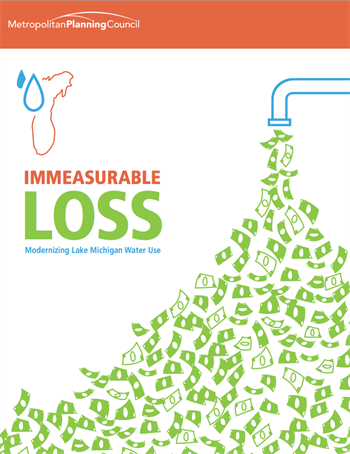
Metropolitan Planning Council
186,000 miles per second. One mile per 4.689 seconds. 40 miles per hour. Forever.
Those are, of course, the actual speed of light and sound, the max running speed of a white-tailed deer (Illinois’ state mammal) and the apparent speed of policy in change in Illinois sometimes. To the best of my knowledge, light, sound and deer can’t go any faster, but in the case of the Ill. Dept. of Natural Resources’ proposed modernizations to the rules governing Lake Michigan water use permits, sometimes things can go a little faster than normal.
On Nov. 18, 2014, the Joint Committee on Administrative Rules—the body of legislators in charge of reviewing administrative rule changes—approved the Ill. Dept. of Natural Resources’ proposed rule changes, only 21 months after the Department first proposed them. Trust me, in Illinois (and lots of other places, to be fair), that’s basically light speed.

The Metropolitan Planning Council (MPC) explored the inherent inefficiencies in the previous rules governing permitting for Lake Michigan usage in detail in Immeasurable Loss, which was released in May 2013. The Ill. Dept. of Natural Resources was shopping around some proposed rule changes at the same time, and they were largely consistent with our recommendations (and vice versa). What sort of inefficiencies? Well, anyone with a permit to draw water from Lake Michigan—or buy Lake Michigan water from anyone who does—must report the amount of water they “lose,” whether due to oversight or leaky infrastructure. The thing is, before these rules changes passed in November, those “permittees” had the ability to deduct huge amounts of lost water due to old pipes from their reported water loss, meaning they were missing an incentive to control how much water they lost—they could simply write it off as “unavoidable leakage” (think leaky pipes, faulty meters, poor accounting).
Another problem? Illinois’ plumbing standards have since been outpaced by the federal government, the marketplace and best available technology.
Our findings in Immeasurable Loss were soon thereafter backed up in a report from the Chicago Metropolitan Agency for Planning and the Center for Neighborhood Technology.
From there, things went quickly. The Ill. Dept. of Natural Resources responded to feedback in September 2013, submitted the rules to the Joint Committee in March 2014, and then in November they were passed. Greased lightning.
Best of all? The adopted rules are very consistent with the recommendations made by the Chicago Metropolitan Agency for Planning, Center for Neighborhood Technology, leading water industry standards, and MPC’s own Immeasurable Loss.
The highlights of the rule change:
- No more terms like “Maximum Unavoidable Leakage” or “Unaccounted For Flow.” Now we account for it all, and don’t forgive old pipes. Moving forward, the Ill. Dept. of Natural Resources will use the term Non-Revenue Water, which is the industry standard. You pumped it, treated it, pumped it again, and somewhere along the line it disappeared and you didn’t sell it. Words matter, and in this case, the term should remind people that water costs something.
- By 2019 the maximum allowable standard for Non-Revenue Water as a percent of total pumpage is 10 percent. When all is said and done, this should result in a net reduction in lost water throughout the Lake Michigan service area. That’s a good thing.
- Out of compliance with that standard? You’ll need to submit a water loss control plan, and for the first time, the Department is creating a template for what that looks like, in partnership with the Chicago Metropolitan Agency for Planning. This assistance will help standardize reporting, but also be a real boon for utilities without a lot of staff capacity.
- Municipal plumbing codes must require use of WaterSense-labeled fixtures.
The net result of all of this is more efficient use of our Lake Michigan water, which, due to the federal legal mechanisms that allow Illinois to divert a specific amount of water from the lake, is arguably the state’s most renewable water supply. That’s a good thing, especially as mounting data from the Illinois State Water Survey continues to tell a pretty gloomy story about the future of the deep aquifer groundwater in use in the southwestern suburbs of Chicago.
This is one of those unheralded policy changes that will likely have profound effects—substantial infrastructure upgrades, better accounting practices, an increase in available Lake Michigan water for new users (or leaving in the lake)—and all in a very short time. I know MPC, Chicago Metropolitan Agency for Planning and Center for Neighborhood Technology all consider this a major step forward in managing northeastern Illinois’ finite water resources, and our hats are all off to the Ill. Dept. Natural Resources Lake Michigan Management Section, its permittees and the Joint Committee for moving so prudently, quickly and professionally from proposal to reality.